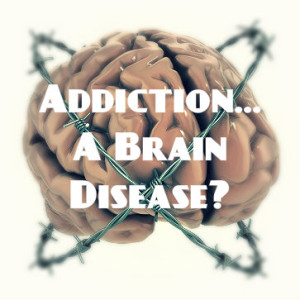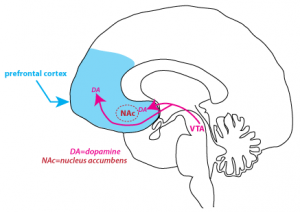People with drug addiction not only suffer from the effects of the drug, but also a negative connotation that surrounds addiction. If I were to ask you to imagine someone who suffers from drug addiction, you, like many other people, would create the image of a “junkie” in your mind. This is part of the problem with addiction, one of many problems that will be discussed later. Many people believe that addiction is a choice; little do they know that drugs have the ability to rewire a brain, forcing people to seek those drugs above all else.
drug addiction, you, like many other people, would create the image of a “junkie” in your mind. This is part of the problem with addiction, one of many problems that will be discussed later. Many people believe that addiction is a choice; little do they know that drugs have the ability to rewire a brain, forcing people to seek those drugs above all else.
The Reward System
Drugs affect the brain’s reward system. Dopamine is the main neurotransmitter involved in this reward and motivation pathway. Drugs cause dopamine release, creating a pleasurable feeling. There are two dopamine receptors that tie in with the addiction dilemma. The first dopamine receptor, D1, is involved with direct activation of the reward pathway, and it has a lower binding affinity for dopamine. The other receptor, D2, is involved with indirect punishment and inhibition of the pathway; it also has a higher binding affinity for dopamine.
Certain brain regions are involved in this reward pathway. In the addiction story, the two major regions are the nucleus accumbens (NAc) and the ventral tegmental area (VTA). The VTA is the site of neurons that produce dopamine, which tells the individual whether a stimulus (drug of abuse) is rewarding or aversive1. VTA neurons target the NAc, which causes the activation of D1 and  D2 receptors creating the rewarding effects of drugs or natural rewards. Under normal conditions, the reward pathway controls an individual’s responses to natural rewards, such as food, sex, and social interactions1. This pathway is important in determining an individual’s motivation and their incentive drive1. Stimulation of the reward pathway tells the individual to repeat what it just did to get that reward1.
D2 receptors creating the rewarding effects of drugs or natural rewards. Under normal conditions, the reward pathway controls an individual’s responses to natural rewards, such as food, sex, and social interactions1. This pathway is important in determining an individual’s motivation and their incentive drive1. Stimulation of the reward pathway tells the individual to repeat what it just did to get that reward1.
But, drug induced stimulation of this pathway could lead to addiction. The VTA-NAc pathway is activated with each drug use2. Drugs, such as opiates, bind to receptors and send signals to dopamine terminals to release more dopamine2. This dopamine release, then, creates a pleasurable feeling that causes individuals to become addicted to that drug, seeking it out over and over for that pleasurable feeling. Repeated use of drugs cause an over-activation of dopamine and stimulation of the receptors involved, thus impairing the regulatory responses for which the brain is responsible2. If the regulatory response is impaired, then it is nearly impossible to stop using the drugs.
Therefore, drug addiction should not be viewed as a repeated choice. You are your brain, and your brain is telling you to seek those drugs for the pleasurable feeling. Each drug has a different mechanism, but they all increase the activity of the reward pathway by increasing dopamine transmission. Drug addiction is truly a disease of the brain, not a choice.